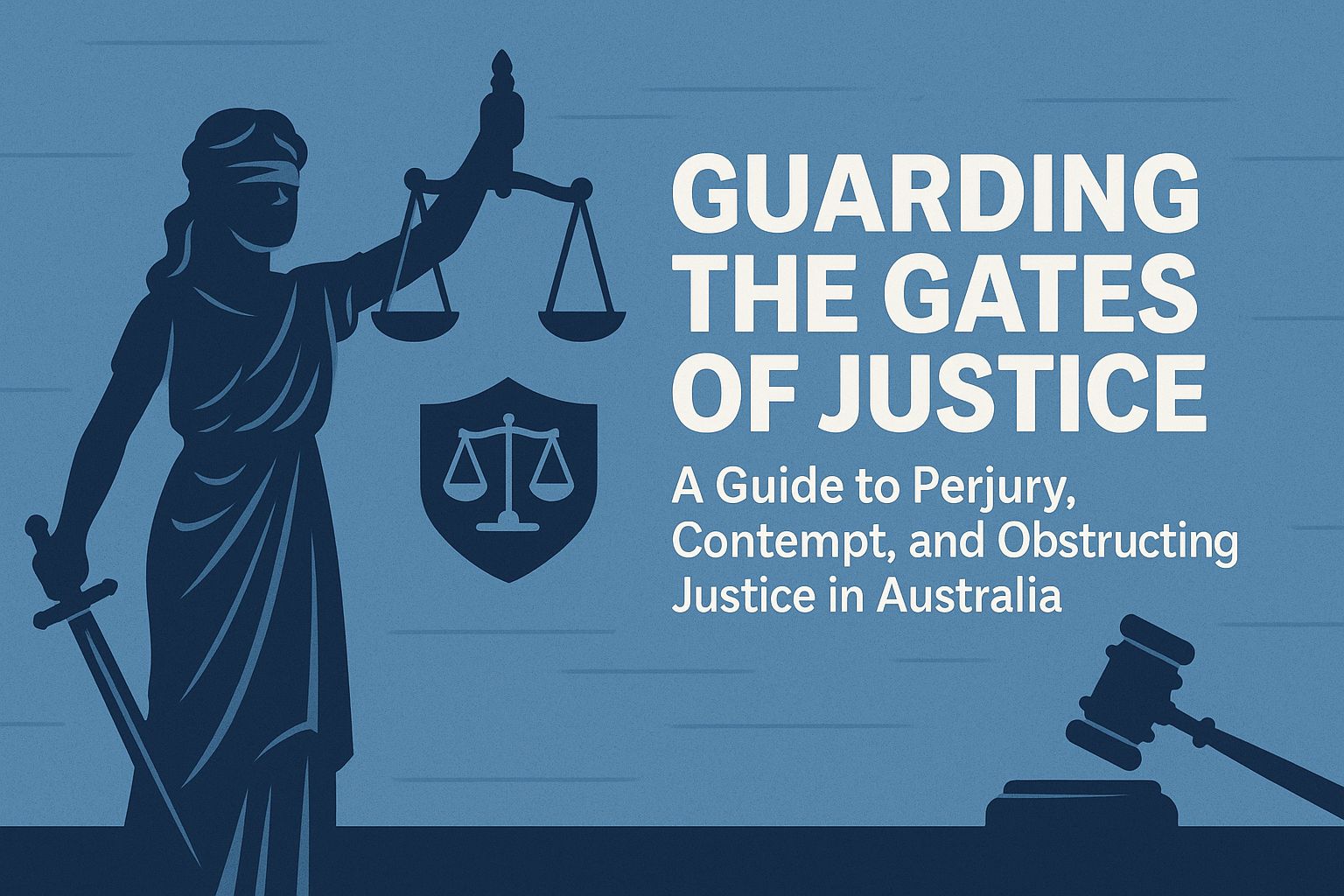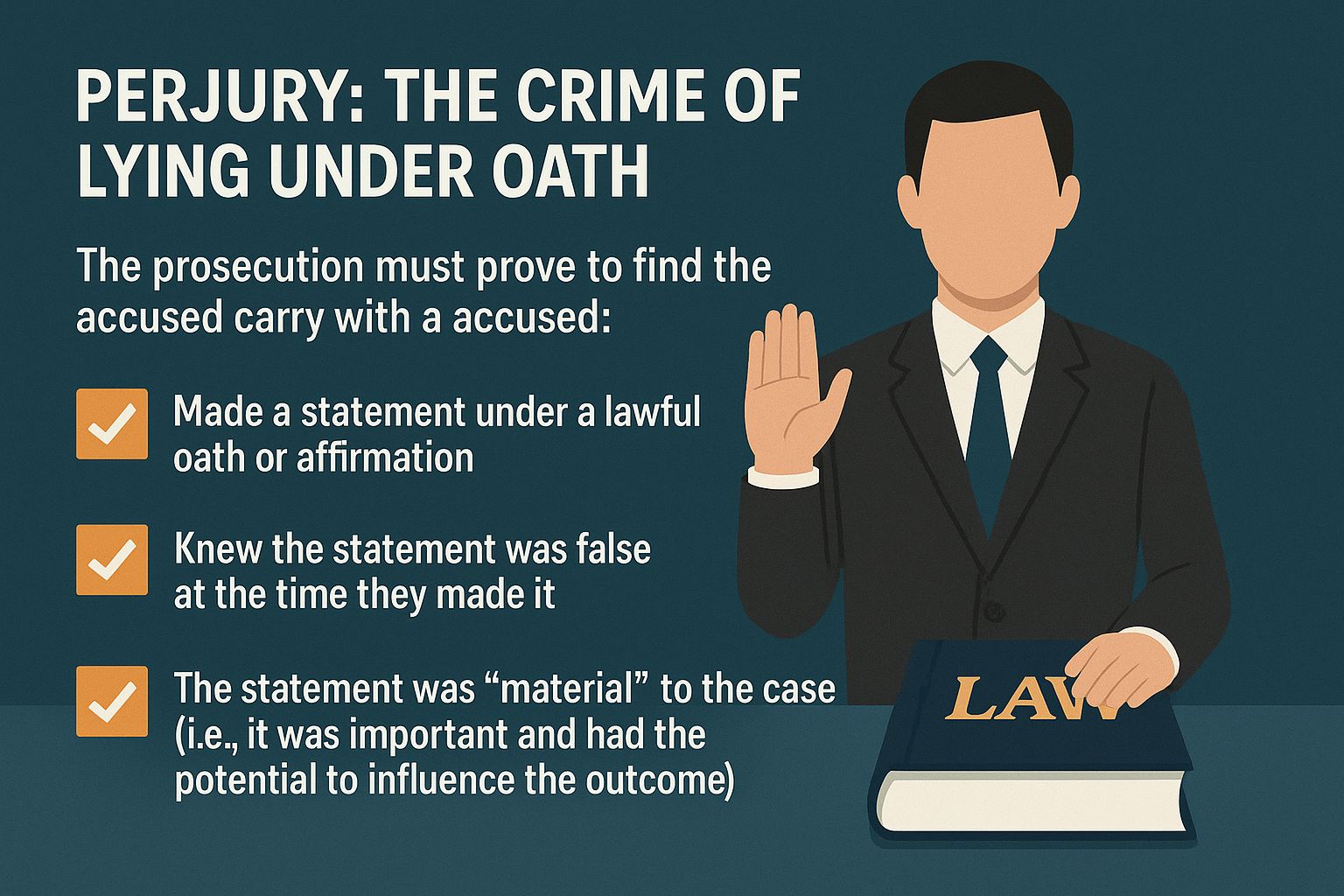Guarding the Gates of Justice: A Guide to Perjury, Contempt, and Obstructing Justice in Australia

Key Takeaways
Core Purpose: Offences against justice are designed to protect the integrity, authority, and core functions of the Australian legal system itself.
Key Offences: This category includes Perjury (lying under oath), Contempt of Court (disrespecting or disobeying the court), and the broad offence of Perverting the Course of Justice (which includes intimidating witnesses and destroying evidence).
Why They Are So Serious: These crimes are not about harm to an individual, but about attacking the foundation of the rule of law. A justice system that cannot rely on truthful evidence and compliance with its orders cannot function.
Severe Penalties: Due to their seriousness, these offences carry heavy penalties, including significant terms of imprisonment, to deter interference with the administration of justice.
Introduction
In our Australian criminal law series, we have covered offences that harm people, like Violent Crime and Sexual Offences, and those that affect property and finances, such as Theft and White-Collar Crime. Today, we explore a different category of crime: offences against the administration of justice itself.
These crimes—perjury, contempt of court, and perverting the course of justice—are fundamental to the law. They can arise during the investigation or trial of any criminal matter, from a simple Traffic Offence hearing to a complex corporate prosecution. While less common than assault or theft, they are treated with extreme severity because they threaten to make a fair trial impossible for anyone.
This guide explains these critical offences, what they involve, and why they are so fiercely prosecuted in Australia.
Important Note: The laws governing offences against justice are a complex mix of statute law (like the Crimes Act 1900 in NSW) and common law (principles developed by judges). This article uses NSW law as a primary example.
Learn more about offences against justice in New South Wales at Crimes Act 1900.
Why Are These Offences Taken So Seriously?
The entire criminal justice system relies on a foundation of truth, authority, and integrity. When a person lies to a court, disobeys a court order, or threatens a witness, they are not just committing a single act—they are attacking the very structure that allows society to resolve disputes and deliver justice.
Without these rules, evidence would be unreliable, court orders would be meaningless, and witnesses would be too afraid to come forward. That is why the penalties are so high; they serve to protect the system for everyone.
Perjury: The Crime of Lying Under Oath
Truth is the cornerstone of any court proceeding. Perjury is the criminal offence of knowingly giving false testimony in a judicial proceeding after having taken an oath or made an affirmation to tell the truth.
To be found guilty, the prosecution must prove that the accused:
Made a statement under a lawful oath or affirmation.
Knew the statement was false at the time they made it.
The statement was "material" to the case (i.e., it was important and had the potential to influence the outcome).
An honest mistake, a lapse in memory, or a confused answer is not perjury. The offence requires a deliberate and knowing lie about a significant matter.
Intimidating Witnesses and Jurors
For the justice system to work, witnesses and jurors must be able to participate without fear. It is a very serious offence to attempt to influence or punish them. This is a form of perverting the course of justice.
This includes:
Threatening or harassing a witness to prevent them from giving evidence or to influence what they say.
Bribing a witness to give false evidence.
Threatening or harassing a juror because of a verdict they reached.
Internal Link: If the intimidation involves threats of physical harm, it is not only an offence against justice but also a serious crime covered in our guide to Violent Crime. If the harassment occurs online, it could also lead to charges under Cybercrime laws.
Contempt of Court: Defying the Authority of the Law
Contempt of court is a broad offence that covers any behaviour that disrespects the authority of the court or obstructs its proceedings.
Contempt in the face of the court: This happens inside the courtroom and includes acts like yelling at a judge, refusing to be quiet, or filming the proceedings without permission.
Contempt by disobeying court orders: This is a common and serious form. It involves wilfully refusing to comply with a legally binding court order, such as refusing to answer questions under a subpoena, breaching an asset-freezing order, or violating the terms of a family law parenting order.
Perverting the Course of Justice: The Broadest Offence
This is a single, overarching offence that captures any act done with the intent to obstruct, prevent, or defeat the administration of justice. It is a "catch-all" for attempts to corrupt the legal process.
Common examples include:
Destroying or hiding evidence (e.g., deleting subpoenaed emails in a fraud case or hiding a weapon).
Making a false accusation to police to get an innocent person into trouble.
Helping a wanted person evade arrest.
Penalties: The Severe Consequences of Interfering with Justice
Because these crimes attack the foundations of the legal system, the penalties are designed to be a powerful deterrent.
| Offence Category | Example NSW Legislation & Maximum Penalty | Common Consequences |
|---|---|---|
| Perjury | Crimes Act 1900 s 327 – Up to 14 years imprisonment | A conviction almost always results in a prison sentence and a criminal record. |
| Intimidating a Witness/Juror | Crimes Act 1900 s 322 – Up to 10 years imprisonment | Imprisonment is a very likely outcome, reflecting the seriousness of the interference. |
| Perverting the Course of Justice | Crimes Act 1900 s 319 – Up to 14 years imprisonment | Lengthy prison sentences are common, especially where the conduct was planned and significant. |
| Contempt of Court | Common Law / Court-specific rules | Can range from a fine to a period of imprisonment, imposed directly by the court. |
Frequently Asked Questions (FAQ)
No. Perjury requires you to knowingly make a false statement. If you are genuinely confused or your memory is incorrect, you have not committed perjury. If you realise you've made a mistake, you should correct it as soon as possible.
Yes. Attempting to influence a witness's testimony, even if you aren't threatening them, can be an offence of perverting the course of justice. You are meant to give your own truthful account, not a coached story.
Ignoring a subpoena (a legal order to attend court) is a form of contempt of court. A court can issue a warrant for your arrest to compel your attendance.
It can be. While fair and informed criticism of a legal judgment is allowed, publishing baseless allegations of corruption, bias, or personal abuse against a judge can be considered "scandalising the court," which is a form of contempt.

While the daily business of Australian courts often deals with crimes of violence, theft, or fraud, the system itself is protected by a powerful set of laws against those who would seek to undermine it. The offences of contempt, perjury, and perverting the course of justice ensure that evidence is truthful, participants are safe, and court orders are followed.
They serve as a stark reminder that participation in the legal system—whether as a party, a witness, or a juror—is a serious civic responsibility. Any attempt to corrupt this process is treated as a direct attack on the rule of law and will be met with the most severe consequences.
AHL Legal: Your Partner in Navigating Justice Offences
Facing charges related to perjury, contempt, or perverting the course of justice? At AHL Legal, we specialize in defending your rights, providing expert guidance and robust legal representation to protect your future.
Learn more about contempt of court and related offences at NSW Courts Contempt Guidelines.
Uphold Justice, Stay Legal
Offences against justice, such as perjury, contempt, and perverting the course of justice, carry severe penalties that can impact your future. Understanding your responsibilities within the legal system is crucial to avoiding these serious charges. Professional legal support is your best ally.
At AHL Legal, we provide expert legal support to guide you through these complex matters with professionalism and expertise.
✅ AHL Legal: Your Trusted Legal Partner
Our experienced team specializes in criminal law, ensuring your rights are protected every step of the way.
📞 Ready to take action? Call us at 1300 91 66 77 for a consultation
🌐 Visit our website: www.ahllegal.com



 1300 91 66 77
1300 91 66 77







 HOME
HOME


